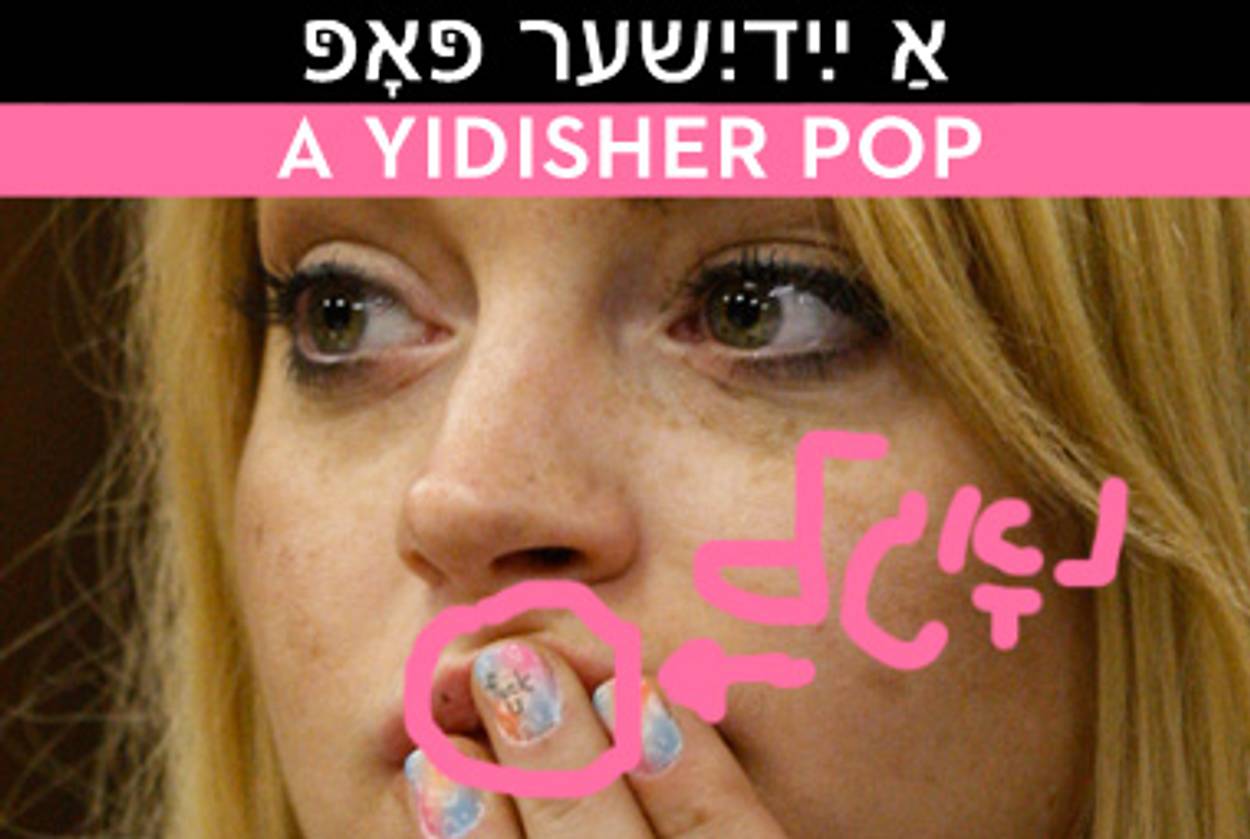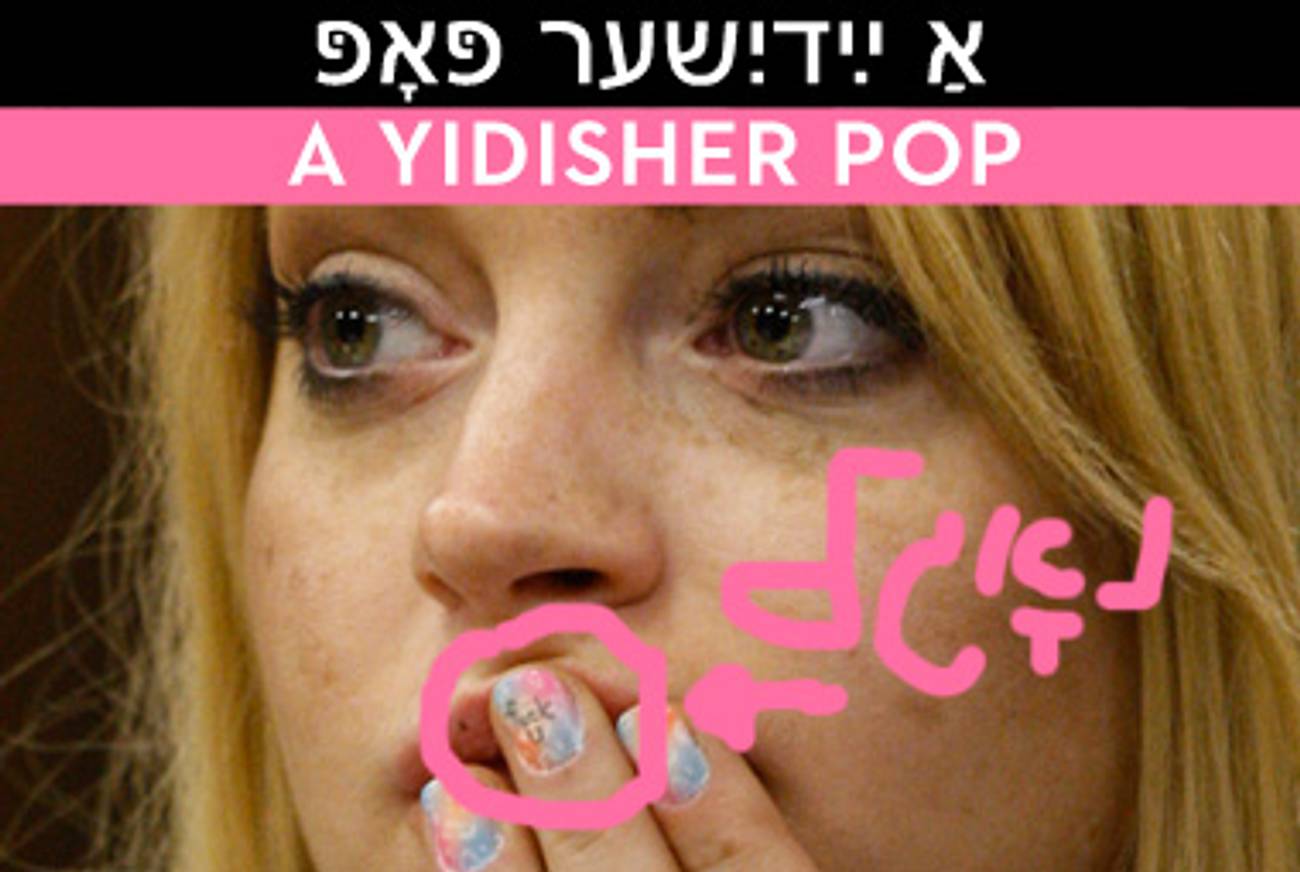A Yidisher Pop
Lindsay, Mel, and a Lesson in Yiddish




This week’s installment is about pronouns and Paul’s predictions, about Polanski’s litigations and some Yiddish conjugations. Let’s get right to it:
לינדזי ווייַזט אוּנדז אירע געפֿילן – אויב ניט מיט אַ גראָבן פֿינגער, איז עס מיט איר נאָגל!
Transliteration:Lindzi vayzt undz ire gefiln—oyb nit mit a grobn finger, iz es mit ir nogl!
Meaning: Lindsay expresses herself—if not by giving the finger, then with her nail!
[audio:https://www.tabletmag.com/wp-content/uploads/ayp/02/sounds/lohan.mp3]
מעל גיבסאָן … אַזאַ צרה! דוּ באַווייַזט ניט דייַן “מעכטיקע האַרץ” נאָר דייַן שמוּציקע, פּראָסטע צוּנג.
Transliteration: Mel Gibson… Aza tsore! Du bavayzt nit dayn “mekhtike harts” nor dayn shmutsike, proste tsung.
Meaning: Mel Gibson… what troubles! You show not your “Brave Heart” but your dirty, crude tongue.
פּאָל, דער אַכט-פֿיסיקער מאָלוּסק: געווינט אוּן געווינט. ער גיט כשרע עצות, אָבער ער אַליין איז טרייף.
Transliteration: Pol, der akht-fisiker molusk: gevint un gevint. Er git koshere eytses, ober er aleyn iz trayf.
Meaning: Paul, the octopus: he wins and wins again. He gives kosher advice, but he himself is trayf.
ניט שוּלדיק??? אַזאַ אויסוווּרף בלייַבט ווי אַ לייַטישער מענטש?
Transliteration: Nit shuldik??? Aza oysvurf blaybt vi a laytisher mentsh?
Meaning: Not guilty? Such a low-life remains a respectable man?
רינגאָ, ווי צוּ 64, אַזוי צוּ 70. מזל טוב ביז 120!
ווען כ’ווער שוין עלטער פֿאַרלירן די האָר
יאָרן פֿון איצט, הייַנט
וועסטוּ מיר נאָך שיקן אַ קליין וואַלענטייַן
געבוּרטסטאָג קאַרטל, פֿלעשעלע ווייַן?
Transliteration: Ringo, vi tsu 64, azoy tsu 70. Mazl tov biz 120!
Ven kh’ver shoyn elter farlirn di hor
yorn fun itst, haynt
vestu mir nokh shikn a kleyn valentayn
geburtstog kartl, fleshele vayn?
Meaning: Ringo, in 70 as in 64, may you live to 120!
When I get older, losing my hair
Many years from now
Will you still be sending me a Valentine
Birthday greetings bottle of wine?
Pronouns and Present Tense דער פּראָנאָם און די איצטיקע צייַט
The Yiddish pronouns in the nominative case are as in any language: the analogues of I You He/She/It are Ikh Du Er/Zi/Es איך, דוּ, ער/זי/עס and the plural pronouns we-you-they are Mir-Ir-Zey מיר-איר-זיי.
For instance, with Lindsay in mind,
I go to jail
You got to jail
She goes to jail
איך גיי אין טוּרמע
דוּ גייסט אין טוּרמע
זי גייט אין טוּרמע
With Mel in mind,
I hit
You hit
He hits
איך שלאָג
דוּ שלאָגסט
ער שלאָגט
And, finally, with Oksana,
I cry
You cry
He does not cry
איך וויין
דוּ וויינסט
ער וויינט ניט
Roman stays free but we stay frustrated, and you stay confused and Mel and Oksana (they) stay angry.
ראָמאַן בלייַבט פֿרייַ, אָבער מיר בלייַבן פֿרוּסטרירט, אוּן איר בלייַבט צעטוּמלט, אוּן זיי בלייַבן אין כּעס.
Use ir איר in Yiddish when addressing new acquaintances, those who are older, or any Beatle you may happen upon. If, for example, you run across Mr. Starr, you can tell him “Ringo, you stay young for us!”
“!רינגאָ, איר בלייבט יוּנג פֿאַר אוּנדז”
Irregular verbs conjugate differently and are irregular in different ways. Consider the verb to give as with Paul the Octopus:
I give advice
You give advice
He gives advice
We give advice
You give advice
They give advice
איך גיב עצות
דוּ גיסט עצות
ער/זי/עס גיט עצות
מיר גיבן עצות
איר גיט עצות
זיי גיבן עצות
Want a bit of homework? How about going through the captions and looking for the names of parts of the body?